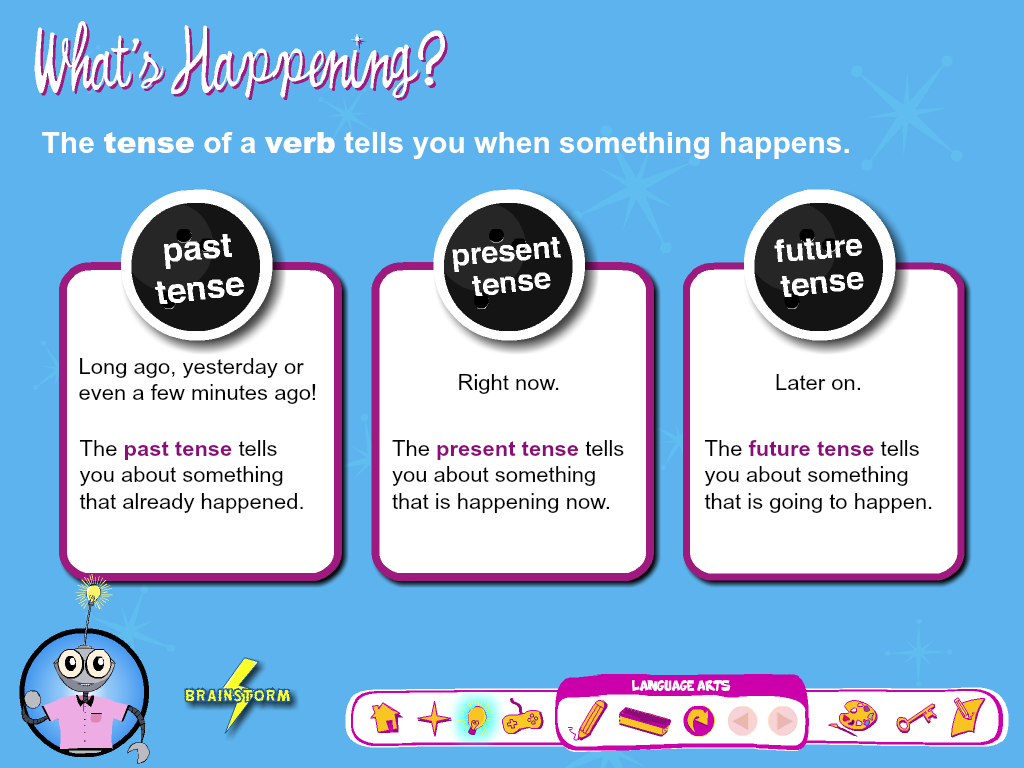Hãy nhập câu hỏi của bạn vào đây, nếu là tài khoản VIP, bạn sẽ được ưu tiên trả lời.

Welcome to hoc24h. Nice to meet you. I think you will learn better than before when you have the help of all of people on webhoc24h.
こんばんわ、ゆろしくおねがいします。
Cũng học khá khá về ngoại ngữ ^^ ![]()
Bạn ơi, thì trong tiếng anh rất quan trọng, nó quyết định điểm số rất nhiều trong bài thi tiếng anh đó. VD như bạn phải viết luận, các thì sẽ giúp bạn ko mắc những lỗi lặt vặt hay là đối vs tất cả các bài khác cũng thế. Nếu ko biết về các thì thì bạn sẽ ko đc điểm cao trong tiếng anh => bạn sẽ cảm thấy chán nản môn này => bạn sẽ lơ đãng hơn và cuối cùng, bạn không muốn hok tiếng anh. Vậy nên, theo mk thì ko có cách nào để bạn làm các dạng bài tập mà ko cần dùng tới các thì cả. Hãy cố gắng hok lại các thì bạn nhé!!! Mình thấy hok các thì cũng dễ mà, với lại bạn mới đang hok lớp 7 thôi nên cố gắng nhé! ![]()

Hello, my name is Tri , this year i am 12 years old. My activities after school is playing soccer, ride a bike, play computer game and read comic. I usually play soccer with my best friends in sport center. Then , i ride a bike with my cousin and i play computer game with my cousin too.Then, i read comic, my favourite comic is Doremon and Conan
bản dịch :
Chào, tôi tên là Trí , năm nay tôi được 12 tuổi. Những hoạt động sau giờ học của tôi là chơi đá bóng, đạp xe, chơi game máy tính và đọc truyện tranh. Tôi thường xuyên chơi đá bóng với những người bạn thân của tôi ở trung tâm thể thao. Sau đó, tôi đạp xe với anh họ và tôi chơi game máy tính cũng với anh họ. Sau đó, tôi đọc truyện tranh, truyện tranh tôi yêu thích là Doremon và Conan
aFTER school I usually masturbate in the classroom , i Watch Porn hub or XNXX to masturbate . I usually watch hentai for 2-3 hours AND I cum in 1 hours . Sometime my sexy teacher stays in class and she asks me to fuck her . So we have a perfect fuck and she s it , she usually says that my dick is bigger than her husband and she wants me to cum in her mouth.Sexy ,big tits girl in my class also my dick, they always say : This is the first time i have seen such a big dick before.One day , all the girls in my class want to fuck me ,so we have the best gangbang ever .Thank you for listen to my activity after school

Đây nhé :>> Chunn
1. Câu cảm thán (exclamation sentences)

Câu cảm thán
Câu cảm thán (exclamation sentences) là loại câu được sử dụng để diễn tả cảm xúc của người nói (vui, buồn, phẫn nộ, thích thú, ngạc nhiên,…) về một sự vật, sự việc nào đó. Trong tiếng Anh, câu cảm thán thường được cấu tạo với từ “What” hoặc “How”. Dấu hiệu nhận biết câu cảm thán
1.1. Câu cảm thán với “What”
Cấu trúc:
- What + (a/an) + adj + danh từ đếm được/danh từ đếm được số nhiều
Ví dụ: What a beautiful skirt! (Chiếc váy đẹp quá)
- What + adj + danh từ không đếm được
Ví dụ: What amazing information! (Thật là một thông tin đáng kinh ngạc)
1.2. Câu cảm thán với “How”
Cấu trúc: How + adjective/ adverb + S + V
Ví dụ: How good she does! (Cô ấy làm tốt lắm)
2. Câu nghi vấn (interrogative sentences)

Câu nghi vấn
Câu nghi vấn (interrogative sentences) hay còn gọi cách khác là câu hỏi, được sử dụng khi người nói muốn được biết thông tin gì đó từ người nghe. Trong chương trình tiếng Anh lớp 7, người học sẽ được biết đến câu nghi vấn kết hợp với các từ sau:
- Bắt đầu bằng WHAT (cái gì). Ví dụ: What is this? (Đây là cái gì thế?), What are you doing? (Bạn đang làm cái gì thế?)
- Bắt đầu bằng WHERE (ở đâu). Ví dụ: Where is pencil? (Cái bút chì ở đâu rồi?), Where do you go tonight? (Bạn sẽ đi đâu tối nay?)
- Bắt đầu bằng WHEN (khi nào). Ví dụ: When do you do your homeworks? (Khi nào thì bạn làm bài tập về nhà thế?), When do you do to work? (Khi nào bạn đi làm vậy?)
- Bắt đầu bằng WHO (ai). Ví dụ: Who is he? (Anh ta là ai thế?)
- Bắt đầu bằng WHY (tại sao). Ví dụ: Why do you go to hospital? (Sao cậu lại phải đến bệnh viện thế?), Why do you this book? (Sao cậu lại thích cuốn sách này?)
- Bắt đầu bằng HOW OFTEN (hỏi về tần suất). Ví dụ: How often do you go swimming a week? (Một tuần cậu đi bơi bao nhiêu lần?)
- Bắt đầu bằng HOW LONG (bao lâu). Ví dụ: How long do you do your homework? (Bạn làm bài tập trong bao lâu?)
- Bắt đầu bằng HOW FAR (bao xa). Ví dụ: How far from your house to your school? (Từ nhà bạn đến trường xa bao nhiêu?)
- Bắt đầu bằng HOW MANY/MUCH (Số lượng). Ví dụ: How many people are there in your family? (có bao nhiêu người trong gia đình bạn?)
3. Câu so sánh (Comparisons)

Câu so sánh
Có hai loại câu so sánh bạn sẽ gặp trong chương trình ngữ pháp tiếng Anh 7:
3.1. So sánh hơn
Là loại câu dùng để so sánh hơn kém giữa 2 sự vật, sự việc. Cấu trúc so sánh hơn trong tiếng Anh cụ thể như sau:
- So sánh hơn dùng với tính từ ngắn: Adj + -er + than + …
Ví dụ: She is taller than me. (Cô ấy cao hơn tôi)
- So sánh hơn dùng với tính từ dài: more + Adj + than + …
Ví dụ: This problem is more difficult than that one. (Vấn đề này khó hơn vấn đề kia)
3.2. So sánh nhất
Là loại câu dùng để so sánh sự vật, sự việc này hơn tất cả những sự vật, sự việc khác ở một điểm nào đó. Cấu trúc dạng câu so sánh nhất gồm:
- So sánh nhất dùng với tính từ ngắn the + Adj + -est
Ví dụ: Lan is the tallest student in her class. (Lan là học sinh cao nhất lớp)
- So sánh nhất dùng với tính từ dài: the + most + Adj
Ví dụ: This is the most difficult problem in the book. (Đây là vấn đề khó nhất trong sách)
4. Các thì trong tiếng Anh (tense)

Các thì trong tiếng Anh
Trong chương trình ngữ pháp tiếng Anh lớp 7, các loại thì thường sử dụng là:
- Thì hiện tại đơn được sử dụng để miêu tả một thói quen hoặc diễn tả một sự thật hiển nhiên. Cấu trúc thì hiện tại đơn trong tiếng Anh là: S + V.
Ví dụ: I am a student. (Tôi là học sinh)
Xem thêm: 10 phút giỏi ngay thì Hiện tại Đơn
- Thì hiện tại tiếp diễn dùng để diễn tả một hành động đang xảy ra tại thời điểm nói. Cấu trúc thì hiện tại tiếp diễn trong tiếng Anh là: S + am/is/are + V-ing.
Ví dụ: The children are playing football now. (Lũ trẻ đang chơi đá banh)
Xem thêm: 10 phút giỏi ngay thì Hiện tại Tiếp diễn
- Thì quá khứ đơn dùng để diễn tả một hành động đã xảy ra và kết thúc trong quá khứ. Cấu trúc thì quá khứ đơn trong tiếng Anh là: S + V (P1).
Ví dụ: I went to the concert last week. (Tôi đã đi đến buổi hòa nhạc vào tuần trước)
Xem thêm: Ẵm trọn điểm với bài tập công thức thì Quá khứ Đơn
- Thì tương lai đơn dùng để diễn tả một hành động hoặc một kế hoạch sẽ xảy ra trong tương lai tại thời điểm nói. Cấu trúc thì tương lai đơn trong tiếng Anh là: S + will + V.
Ví dụ: At 10 o’clock tomorrow, my friends and I will be going to the museum. (Vào lúc 10 giờ sáng mai, tôi và đám bạn sẽ đi viếng thăm viện bảo tàng)
Xem thêm: 10 phút giỏi ngay thì Tương lai Đơn & Tương lai Gần
Ngoài ra, bạn cũng có thể tham khảo video sau để nắm được kiến thức khái quát về tất cả các thì trong tiếng Anh nhé: Tổng hợp kiến thức về các thì trong tiếng Anh
5. Câu lời khuyên (advice sentences)

Câu lời khuyên
Câu lời khuyên (advice sentences) được sử dụng để thuyết phục, khuyên bảo người nghe nên làm điều gì đó. Có 2 dạng câu lời khuyên trong tiếng Anh:
- Cấu trúc: S + should/ought to
Ví dụ: You should do your housework. (Bạn nên làm việc nhà đi)
- Cấu trúc: S + must (thường diễn tả một mệnh lệnh)
Ví dụ: You must do your homework (Em phải làm bài tập về nhà)
6. Câu hướng dẫn chỉ đường (Giving directions)

Câu hướng dẫn chỉ đường
- Câu hỏi đường: Could you tell me the way to/how to get to ___ ?
- Chỉ đường: go straight ahead,...

2. A Thousand Years – Christina Perri
3. Apologize – Timbaland

PART A: LISTENING COMPREHENSION (10pts)
I. Listen to the conversation and decide which statements are true or false. k (v) in the right column. (6pts)
Statements | True | False |
1. Mi enjoys collecting glass bottles. | ||
2. She started her hobby four years ago. | ||
3. Her father shares this hobby with her. | ||
4. She thinks collecting glass bottles is difficult. | ||
5. She can make flower vases or lamps from these bottles. | ||
6. She will continue her hobby in the future. |
II. You will hear a woman asking for information about the city bus tour. Listen and complete the answers 7-10. (4pts)
City Bus Tours
Bus Tours depart every (7) _________ minutes. |
Last tour departs at (8) __________. |
ket prices: + Adults: £10 + Children: £ 5 |
Tour Bus Office Address: (9) __________________ Street. |
Buses leave from the (10) _________ Hall. |
PART B: PRONUNCIATION, VOCABULARY AND GRAMMAR
III. Choose the word A, B, C or D whose underlined part is pronounced differently from the others. (4pts)
11. A. pick B. ticket C. rock D. vacation
12. A. start B. minutes C. measure D. sick
13. A. together B. guess C. regular D. teenager
14. A. knife B. socket C. desk D. bookshelf
IV. Choose the best answer A, B, C or D to complete the sentences. (10pts)
15. This papaya is green. It is not __________.
A. small B. yellow C. good D. ripe
16. I didn't go to the cinema yesterday and Lan __________.
A. doesn't, either B. didn't, neither C. didn't, either D. wasn't, either
17. Would you to go to the movies tonight? - __________
A. Yes, I do B. Yes, I would C. Yes, I'd love to D. Yes, please
18. Some people play video games at home. __________ play them in arcades.
A. Others B. Other C. Another D. Each other
19. Hoa is reading short stories __________ Jack London.
A. of B. from C. by D. with
20. She was __________ of watching television.
A. interested B. tired C. tiring D. pleased
21. My new shoes don't __________ me very well. They are too big.
A. suit B. match C. fit D. agree
22. Mary and I are looking forward __________ our old friend.
A. of seeing B. for seeing C. to see D. to seeing
23. There are two churches in the town and __________ of them are extremely old.
A. both B. each C. all D. most
24. I'm going to a wedding on Saturday. __________ is getting married.
A. A friend of me B. A friend of mine C. One my friend D. A friend of I
V. Supply the correct tense or form of the verbs in brackets. (10pts)
25. I remember (meet) him somewhere.
26. You look tired. Sit down and I (make) you a cup of tea.
27. I'm trying (finish) my work. Please, stop (talk).
28. She paid for her ket and (leave).
29. You look worried. What you (think) about?
30. Everything (look) strange to newcomers.
31. My friend asked me (not tell) to anyone about it.
32. After (leave) school, John (find) it very difficult to get a job.
VI. Give the correct form of the words in brackets to complete the sentences. (10pts)
33. He tried to learn Chinese but he was ___________. (SUCCESS)
34. He will never forget his happy ___________. (CHILD)
35. How is your grandfather? – He is much ___________ today. (WELL)
36. I watch TV every day because it is very ___________. (INFORM)
37. We must keep our environment ___________. (POLLUTE)
38. They canceled all the ___________ because of the fog. (FLY)
39. I'm going to the shop for a rice ___________. What brand do you recommend? (COOK)
40. Every ___________ in my neighborhood has at least one TV set. (HOUSE)
41. I can do all of these exercises ___________. (EASY)
42. His ___________ of some words is not correct. (PRONOUNCE)
VII. Supply the missing prepositions. (5 pts)
43. I couldn't meet Mary because she was ________.
44. It won't be very long. I'll be back ________ ten minutes.
45. Please, translate this arle ________ English for me.
46. My brother is much better ________ gardening than me.
47. Sam Son beach is always crowded ________ tourists in the summer.
PART A: PHONES: (5 points).
I. Choose the word whose underlined part pronounced differently from that of the others by circling A, B, C or D.
1. A. nervous B. scout C. household D. mouse
2. A. last B. taste C. fast D. task
3. A. improved B. returned C. arrived D. stopped
II. Choose the word whose stress pattern is different from the others by circling A, B, C or D .
1. A. comfort B. nation C. apply D. moment
2. A. medical B. advise C. vegetables D. physical
PART B: VOCABULARY AND GRAMMAR:
I. Circle the best answer A, B, C or D to complete the following sentences: (10 points).
1. Most people enjoy .......................to different parts of the world.
A. to travel B. travel C. traveling D. traveled
2. ....................... time do you spend learning English every day?
A. How much B. How many C. How long D. How often
3. This orange tastes ........................
A. sweetly B. sweety C. sweet D. sweets
4. Every one had ....................... at the picnic.
A. good time B. a good time C. good times D. better time
5. Would you to .......................for a walk later?
A. have B. make C. do D. go
6. Please don’t ....................... so much noise.
A. go B. make C. do D. take
7. Is there anything good.......................TV tonight?
A. on B. in C. near D. at
8. My mother doesn’t coffee and .......................
A. neither do I B. neither I do C. either do I D. I don’t too
9. Wear your hat. It will .......................your head.
A. protect B. defend C. secure D. guarantee.
10. The news on TV last night...........................very good.
A. was B. has C. were D. be
11. My father often drives his car ______ a speed of 50 kilometres an hour.
A. with B. on C. in D. at
12. Water never runs ______.
A. downhill B. uphill C. upside D. downside
13. It will be ready _______ two weeks.
A. for B. on C. in D. to
14. His parents were _______ poor to send him to school.
A. too B. much C. so D. very
15. It took ______ time to learn this lesson.
A. so many B. so C. so much D. such
16. He can’t buy that car because he has ______ money.
A. a lot of B. a little C. little D. few
17. It is ______ book that just a few people it.
A. so an old B. so old C. such old D. such an old
18. Unless you ______ quiet, I’ll go out.
A. don’t keep B. keep C. kept D. didn’t keep
19. How far is it from your house to your school? - “ ________”
A. I take 20 minutes to get to my school.
B. It took 20 minutes to get to my school.
C. It takes me 20 minutes to get to my school.
D. It took me 20 minutes to get to my school.
20. How often do you go to the post office? - “ _________”
A. two a week B. twice a week C. two times a week D. second time a week
II. Give the correct form of the verbs in brackets.
1. What you (do)…………at the moment? I (watch) ………….T.V.
2. We (not buy)................a book yesterday.
3. You must (do) ......................your homework before watching TV.
4. How much it ( cost ) …………….to mail a latter to England?
5. I will send him the message as soon as he (return)………………
6. A little girl can’t spend all her time (listen) ……………..to stories.
7. Hong and Nam (be )............ absent from class yesterday?
8. When my sister and I (live)................in Hue we (visit)............... a lot of interesting places.
III. Fill in the blank with one suitable preposition.
1. Life ……….the city is .different from that in the country.
2. Trang received a letter …………her aunt last week.
3. Eating too much candy is bad …………you.
4. Bao is very good ………………fixing house hold appliances.
5. We usally go fishing ………….summer.
6. They always go to school …………foot.
7. There are some English books ……….. the back of the library.
8. My school team took part …………… walking competition last year.
9. Please, come ……………….. It is cold outside.
10. Mr. Long is having a meeting ………….8.00 and 10.00 am today.
IV. Give the correct form of the words in parentheses. (10 points).
1. She often feels …………………when she gets bad marks. (happy)
2. My stomachache ....................... after I took the tablets. (appear)
3. My favorite subject at school is physical…………….. (educate)
4. Do you know that video games may be .................? (addict)
5. Catching the common cold is ................for everybody. (please)
6. Hoa is the most…………………………. girl in her class. (beauty)
7. My father has a ...................…computer. He often brings it with him when he’s away on business. (port)
8. Some of the children …….boys, play marbles when there is a break. (main)
9. My sister has a big……………………….….of stamps. (collect)
10. I have ....................time to play than my friends. (little)
mk mà onlike sẽ làm ok